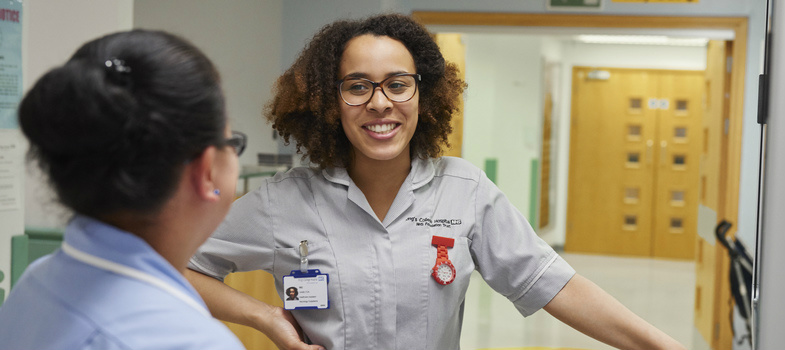2.10 Bladder and bowel problems
Incontinence (where someone can’t control their bladder or bowel) and constipation (where someone has trouble passing stools) are common for people with Parkinson’s. They can be caused either by the condition or by Parkinson’s medications.
Many people with Parkinson’s experience bladder and bowel problems. However, it is important to remember that some of these problems can be common in men and women of all ages, whether they have Parkinson’s or not. So it doesn’t necessarily mean that any problems a person with Parkinson’s has are a result of their condition. There may be other causes for their symptoms that can be treated effectively.
Constipation is a common symptom of Parkinson’s and unfortunately some Parkinson’s medication can make this worse. It is important that people with Parkinson’s do not become constipated as this can result in poor absorption of their medication and therefore poor symptom control.
Bladder and bowel problems can impact on people’s lives, causing discomfort and embarrassment.
Bladder problems
The two main bladder problems associated with Parkinson’s are urge incontinence (the need to urinate immediately, without warning) and nocturia (an overactive bladder that causes people to wake in the night). The bladder may also empty when someone is asleep. A common bladder problem in the general population is stress incontinence.
For women, childbirth can stretch pelvic floor muscles, causing incontinence. Falling hormone levels caused by the menopause may also mean the watertight seal is less effective. For men, prostate problems may cause difficulty emptying the bladder, the need to urinate more often, urgency or retention.
Treating bladder problems
Depending on the problem, medication, bladder training, pelvic floor exercises, catheterisation or surgery may help with bladder problems.
Often people cut down on the amount of fluid they drink when they experience bladder problems. They should be encouraged to drink as much fluid as usual, although they may find it helpful to cut out caffeine, fizzy drinks and alcohol. Reducing fluids could cause constipation, which could reduce the absorption of medication.
There are also many different products that can help, including handheld urinals, pads, underwear and bed protection.
Bowel problems
People with Parkinson’s may experience constipation, diarrhoea or a weak sphincter. Some people with the condition may soil their underwear because they are unable to wipe effectively.
Any change in bowel habit, particularly if there is blood in the stool, should be reported to a person’s GP. Constipation should be treated to avoid impaction – when the bowel is loaded with hard stools and so begins to overflow. Impaction can cause a complete obstruction to the bowel, needing urgent medical attention.
‘Incontinence pads…Not a very nice subject to talk about, but it’s got me out of trouble a few times. It took me a whole year to decide to wear these. Sometimes you just have to give in and be sensible.’
Treating bowel problems
You can help people avoid becoming constipated by increasing their fluid intake, encouraging them to take exercise and increasing their intake of fibre-rich foods. Laxatives may also help.
How does fibre help?
Fibre works by absorbing fluid as it moves through the bowel, forming a soft stool that can be passed more easily. But too much bulk can increase constipation, especially if the person does not drink enough.
Make sure your client drinks at least eight to ten cups (or six to ten mugs) of fluid a day. Any fluid is suitable, including water, fruit juice, milk, tea, coffee and squash.
People with Parkinson’s can increase their fibre intake by doing the following:
- Choosing a breakfast cereal containing wheat, wheat bran or oats such as Weetabix, porridge or bran flakes.
- Eating more vegetables, especially peas, beans and lentils.
- Eating more fruit – fresh, stewed, tinned or dried – such as prunes or oranges.
- If your patient has difficulty with chewing high-fibre food, there are soluble varieties available and even some high-fibre drinks.
- Loose, extra bran that can be added to food is not recommended by dietitians. This can lead to bloating and can reduce the absorption of vitamins and minerals by the body.
When increasing a person’s fibre intake, it is important to do so gradually to avoid bloating or flatulence (wind). Introduce one new source of fibre every three days.
Remember that some people with Parkinson’s may have problems chewing and swallowing, which can make it difficult to eat a diet with plenty of fibre. A dietitian or speech and language therapist can give advice about this.
Practical problems
Keep in mind that bladder and bowel problems can be made worse by practical issues. For example, some people may find it hard to undo clothing such as zips. Others may find it difficult to position themselves on the toilet correctly. The occupational therapist can provide advice about any necessary adaptations.
Professional help
Professional help may come from the GP, urologist, gynaecologist, the district nurse or the continence advisor, among others.
Find out more in the Parkinson’s UK bladder and bowels booklet [Tip: hold Ctrl and click a link to open it in a new tab. (Hide tip)] .
Actions to take
- If the person with Parkinson’s has movement problems, you may (where appropriate) need to help them to visit the toilet.
- Someone with Parkinson’s might need to urinate often and may need to visit the toilet without much warning.
- Allow plenty of time so they feel comfortable and are unhurried.
- Consider aids such as commodes or urinals.
- Keep or recommend keeping a fluid, diet and stool chart. These can be taken to the person’s next appointment with their specialist to assess their difficulties.
2.9 Sleep problems and tiredness
